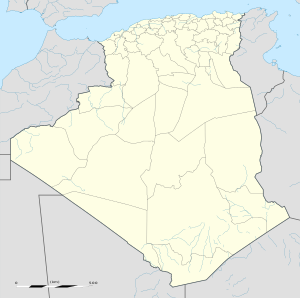
Algeria, officially the People's Democratic Republic of Algeria, is a country in the Maghreb region of North Africa. It is bordered to the northeast by Tunisia; to the east by Libya; to the southeast by Niger; to the southwest by Mali, Mauritania, and Western Sahara; to the west by Morocco; and to the north by the Mediterranean Sea. The capital and largest city is Algiers, located in the far north on the Mediterranean coast.

Albert Camus was a French philosopher, author, dramatist, journalist, world federalist, and political activist. He was the recipient of the 1957 Nobel Prize in Literature at the age of 44, the second-youngest recipient in history. His works include The Stranger, The Plague, The Myth of Sisyphus, The Fall and The Rebel.

Algiers is the capital and largest city of Algeria as well as the capital of the Algiers Province. The city's population at the 2008 census was 2,988,145 and in 2020 was estimated to be around 4,500,000. Located in the north-central part of the country, it extends along the shores of the Bay of Algiers in the heart of the Maghreb region making it classified among the biggest cities in North Africa, the Arab world and the Mediterranean, due to it being a major center of culture, arts, gastronomy and trade.
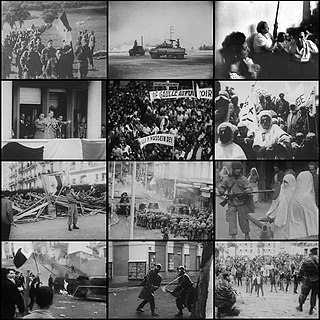
The Algerian War was a major armed conflict between France and the Algerian National Liberation Front (FLN) from 1954 to 1962, which led to Algeria winning its independence from France. An important decolonization war, it was a complex conflict characterized by guerrilla warfare and war crimes. The conflict also became a civil war between the different communities and within the communities. The war took place mainly on the territory of Algeria, with repercussions in metropolitan France.

The French colonial empire comprised the overseas colonies, protectorates, and mandate territories that came under French rule from the 16th century onward. A distinction is generally made between the "First French colonial empire", that existed until 1814, by which time most of it had been lost or sold, and the "Second French colonial empire", which began with the conquest of Algiers in 1830. On the eve of World War I, France's colonial empire was the second-largest in the world after the British Empire.

French Algeria, also known as Colonial Algeria, was the period of Algerian history when the country was a colony and later an integral part of France. French rule lasted until the end of the Algerian War which resulted in Algeria gaining independence on 5 July 1962.

The Maghreb, also known as the Arab Maghreb and Northwest Africa, is the western part of the Arab world. The region comprises western and central North Africa, including Algeria, Libya, Mauritania, Morocco, and Tunisia. The Maghreb also includes the disputed territory of Western Sahara. As of 2018, the region had a population of over 100 million people.
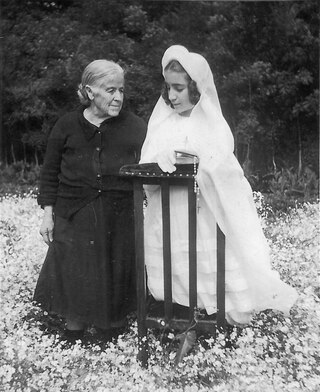
The pieds-noirs are an ethno-cultural group of people of French and other European descent who were born in Algeria during the period of French colonial rule from 1830 to 1962. Many of them departed for mainland France during and after the war by which Algeria gained its independence in 1962.
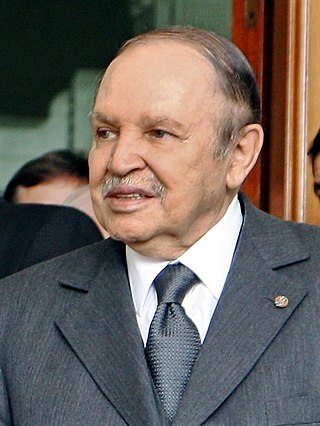
Abdelaziz Bouteflika was an Algerian politician and diplomat who served as the seventh president of Algeria from 1999 to his resignation in 2019.

The National Liberation Front, commonly known by its French acronym FLN, is a nationalist political party in Algeria. It was the principal nationalist movement during the Algerian War and the sole legal and ruling political party of the Algerian state until other parties were legalised in 1989.

Algeria, as of 2024, is divided into 58 wilayas (provinces). Prior to December 18, 2019, there were 48 provinces. The 58 provinces are divided into 1,541 baladiyahs (municipalities). The name of a province is always that of its capital city.

Constantine, also spelled Qacentina or Kasantina, is the capital of Constantine Province in northeastern Algeria. During Roman times it was called Cirta and was renamed "Constantina" in honour of Emperor Constantine the Great. Located somewhat inland, Constantine is about 80 kilometres from the Mediterranean coast, on the banks of the Rhumel River.

The Algeria national football team represents Algeria in men's international football, and is governed by the Algerian Football Federation. The team plays their home matches at the 5 July Stadium in Algiers and Miloud Hadefi Stadium in Oran. Algeria joined FIFA on 1 January 1964, a year and a half after gaining independence. They are the current champions of the FIFA Arab Cup.

The Algerian Civil War, known in Algeria as the Black Decade, was a civil war fought between the Algerian government and various Islamist rebel groups from 11 January 1992 to 8 February 2002. The war began slowly, as it initially appeared the government had successfully crushed the Islamist movement, but armed groups emerged to declare jihad and by 1994, violence had reached such a level that it appeared the government might not be able to withstand it. By 1996–97, it had become clear that the Islamist resistance had lost its popular support, although fighting continued for several years after.

The Algerian Football Federation (AFF); is the governing body of football in Algeria. Formed in 1962 and was based in the capital Algiers. It has jurisdiction on the Algerian football league system and is in charge of the men's and women's national teams. Although an unofficial national team had played fixtures since 1958, the first recognized international took place in January 1963, some six months after independence. In 2021, twenty structures were added to the Algerian Football Federation. The Algerian Football Federation is considered a member of FIFA.
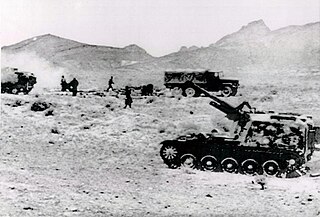
The Sand War was a border conflict between Algeria and Morocco fought from September 25 to October 30, 1963, although a formal peace treaty was not signed until February 20, 1964. It resulted largely from the Moroccan government's claim to portions of Algeria's Tindouf and Béchar provinces. The Sand War led to heightened tensions between the two countries for several decades.

Jeunesse Sportive de Kabylie, known as JS Kabylie or JSK, is an Algerian professional football club based in Tizi Ouzou, Kabylia. The club is named after the cultural, natural and historical region that is home to the Kabyle Berber people speaking Kabyle. The club was founded in 1946 and its colours are yellow and green. The club currently plays in the Algerian Ligue Professionnelle 1.

An Islamist insurgency is taking place in the Maghreb region of North Africa, followed on from the end of the Algerian Civil War in 2002. The Algerian militant group Salafist Group for Preaching and Combat (GSPC) allied itself with al-Qaeda to eventually become al-Qaeda in the Islamic Maghreb (AQIM). The Algerian and other Maghreb governments fighting the militants have worked with the United States and the United Kingdom since 2007, when Operation Enduring Freedom – Trans Sahara began.
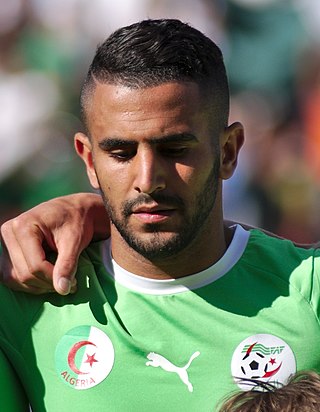
Riyad Karim Mahrez is a professional footballer who plays as a right winger for Saudi Pro League club Al-Ahli and captains the Algeria national team.
On 29 January 2021, Algeria launched a COVID-19 vaccination campaign, a day after receiving its first shipment of 50,000 doses of the Russia's Sputnik V vaccine. As of 6 June 2021, around 2.5 million doses have been administered. Algeria is currently vaccinating its population with both Sputnik V and Oxford-AstraZeneca vaccines.


